|
|
|
Sort Order |
|
|
|
Items / Page
|
|
|
|
|
|
|
| Srl | Item |
| 1 |
ID:
087918
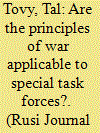

|
|
|
|
|
| Publication |
2009.
|
| Summary/Abstract |
The infamous US raid in Mogadishu was a turning point in the Somali civil war. Although the special forces involved sought to observe the principles of war, the entanglement of the mission indicates a profound violation of those principles. Without effective intelligence and appropriate equipment, the task force embarked on an assault that disregarded the crucial elements of surprise and the achievement of relative superiority.
|
|
|
|
|
|
|
|
|
|
|
|
|
|
|
|
| 2 |
ID:
191925
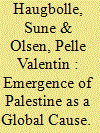

|
|
|
|
|
| Summary/Abstract |
In the late 1960s, Palestine became an iconic signifier of solidarity and support for the Left, but also a transgressive tool that shaped and re-situated ideological positions at domestic levels. In this article, we attempt to answer why, how, and when this happened. Most research to date has stressed the global diplomatic offensive by the PLO (Palestine Liberation Organization). Palestinian revolutionary thought and action are obviously the primary explanatory factors for the emergence of their cause internationally. However, a one-sided approach blurs the agency of the global revolutionaries and solidarity activists who helped elevate Palestine to a global cause. This article takes a comparative approach and uses Denmark and Norway as two illustrative examples of Palestine’s transformation into a global leftist cause. Denmark and Norway are central cases because solidarity movements in Scandinavia developed early on, and because they exemplify how Fatah, in Norway, and the Popular Front for the Liberation of Palestine (PFLP), in Denmark, advanced different models of solidarity and cultural diplomacy. We compare these two cases with new evidence from other countries in order to summarize how a cultural transfer of symbols, interpretations, experiences, and ideological positioning took place in the 1960s and 1970s through meetings, translations, and organizational links.
|
|
|
|
|
|
|
|
|
|
|
|
|
|
|
|
| 3 |
ID:
165991
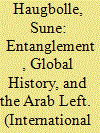

|
|
|
| 4 |
ID:
182932
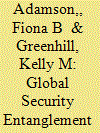

|
|
|
|
|
| Summary/Abstract |
The world today is profoundly interconnected, but also characterized by ongoing national competition and intra-state conflict. At the nexus of these dynamics is the question of cross-border mobility, which cuts through and connects myriad, disparate areas of “entangled” security—from pandemics to climate change, to conflict and military engagement, to challenges to democracies in the form of internal polarization and external threats. The COVID-19 pandemic provides a striking illustration of this “global security entanglement” in action. This essay presents the concept of security entanglement, illustrates how it operates, and explores some of its theoretical and practical implications.
|
|
|
|
|
|
|
|
|
|
|
|
|
|
|
|
| 5 |
ID:
182448
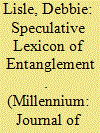

|
|
|
|
|
| Summary/Abstract |
This intervention offers a speculative lexicon to help students and scholars of global politics think critically and creatively about entanglement. It is neither definitive nor complete, but instead offers some possible points of entry into a contested field. It mobilises two particular claims: (1) that entanglement always involves both human and non-human entities; and (2) that entanglement is always emergent and in process. As a whole, this speculative lexicon is intended to help us sense the moment when entanglements intensify in ways that render them stable; attune to these durabilities in order to analyse their constitutive logics of inclusion/exclusion; acknowledge our own irrevocable entanglement in these logics; care for those bodies, lifeworlds, species and habitats that are targeted or abandoned by such logics; and craft mutual projects to disrupt, disaggregate and re-route these logics. Because entanglements are always emerging, dissipating and reconvening, the practice of navigating this open terrain is disorienting and often frustrating. We may desire a final destination where entanglements solidify and horizons magically appear, but giving in to that desire reproduces the violence of enclosure. This lexicon is offered as a way to keep the political terrain of entanglement open so we can collectively ensure that contestation remains a possibility.
|
|
|
|
|
|
|
|
|
|
|
|
|
|
|
|
|
|
|
|
|